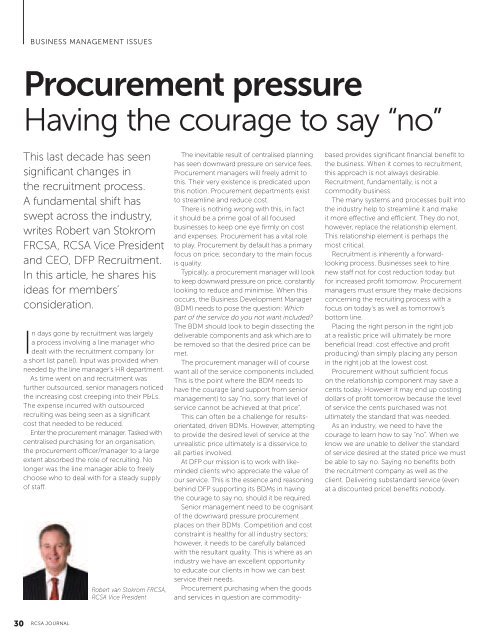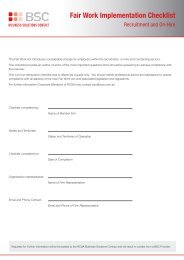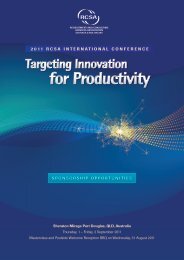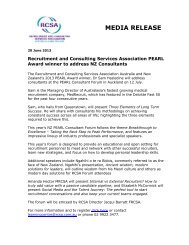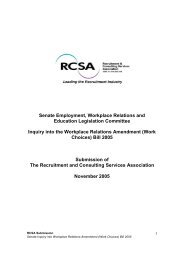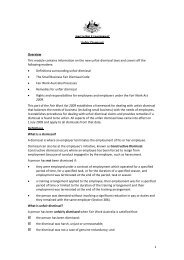June 2012.pdf - RCSA
June 2012.pdf - RCSA
June 2012.pdf - RCSA
You also want an ePaper? Increase the reach of your titles
YUMPU automatically turns print PDFs into web optimized ePapers that Google loves.
BUSINESS MANAGEMENT ISSUES<br />
Procurement pressure<br />
Having the courage to say “no”<br />
This last decade has seen<br />
significant changes in<br />
the recruitment process.<br />
A fundamental shift has<br />
swept across the industry,<br />
writes Robert van Stokrom<br />
F<strong>RCSA</strong>, <strong>RCSA</strong> Vice President<br />
and CEO, DFP Recruitment.<br />
In this article, he shares his<br />
ideas for members’<br />
consideration.<br />
In days gone by recruitment was largely<br />
a process involving a line manager who<br />
dealt with the recruitment company (or<br />
a short list panel). Input was provided when<br />
needed by the line manager’s HR department.<br />
As time went on and recruitment was<br />
further outsourced, senior managers noticed<br />
the increasing cost creeping into their P&Ls.<br />
The expense incurred with outsourced<br />
recruiting was being seen as a significant<br />
cost that needed to be reduced.<br />
Enter the procurement manager. Tasked with<br />
centralised purchasing for an organisation,<br />
the procurement officer/manager to a large<br />
extent absorbed the role of recruiting. No<br />
longer was the line manager able to freely<br />
choose who to deal with for a steady supply<br />
of staff.<br />
Robert van Stokrom F<strong>RCSA</strong>,<br />
<strong>RCSA</strong> Vice President<br />
The inevitable result of centralised planning<br />
has seen downward pressure on service fees.<br />
Procurement managers will freely admit to<br />
this. Their very existence is predicated upon<br />
this notion. Procurement departments exist<br />
to streamline and reduce cost.<br />
There is nothing wrong with this, in fact<br />
it should be a prime goal of all focused<br />
businesses to keep one eye firmly on cost<br />
and expenses. Procurement has a vital role<br />
to play. Procurement by default has a primary<br />
focus on price; secondary to the main focus<br />
is quality.<br />
Typically, a procurement manager will look<br />
to keep downward pressure on price, constantly<br />
looking to reduce and minimise. When this<br />
occurs, the Business Development Manager<br />
(BDM) needs to pose the question: Which<br />
part of the service do you not want included<br />
The BDM should look to begin dissecting the<br />
deliverable components and ask which are to<br />
be removed so that the desired price can be<br />
met.<br />
The procurement manager will of course<br />
want all of the service components included.<br />
This is the point where the BDM needs to<br />
have the courage (and support from senior<br />
management) to say “no, sorry that level of<br />
service cannot be achieved at that price”.<br />
This can often be a challenge for resultsorientated,<br />
driven BDMs. However, attempting<br />
to provide the desired level of service at the<br />
unrealistic price ultimately is a disservice to<br />
all parties involved.<br />
At DFP our mission is to work with likeminded<br />
clients who appreciate the value of<br />
our service. This is the essence and reasoning<br />
behind DFP supporting its BDMs in having<br />
the courage to say no, should it be required.<br />
Senior management need to be cognisant<br />
of the downward pressure procurement<br />
places on their BDMs. Competition and cost<br />
constraint is healthy for all industry sectors;<br />
however, it needs to be carefully balanced<br />
with the resultant quality. This is where as an<br />
industry we have an excellent opportunity<br />
to educate our clients in how we can best<br />
service their needs.<br />
Procurement purchasing when the goods<br />
and services in question are commoditybased<br />
provides significant financial benefit to<br />
the business. When it comes to recruitment,<br />
this approach is not always desirable.<br />
Recruitment, fundamentally, is not a<br />
commodity business.<br />
The many systems and processes built into<br />
the industry help to streamline it and make<br />
it more effective and efficient. They do not,<br />
however, replace the relationship element.<br />
This relationship element is perhaps the<br />
most critical.<br />
Recruitment is inherently a forwardlooking<br />
process. Businesses seek to hire<br />
new staff not for cost reduction today but<br />
for increased profit tomorrow. Procurement<br />
managers must ensure they make decisions<br />
concerning the recruiting process with a<br />
focus on today’s as well as tomorrow’s<br />
bottom line.<br />
Placing the right person in the right job<br />
at a realistic price will ultimately be more<br />
beneficial (read: cost effective and profit<br />
producing) than simply placing any person<br />
in the right job at the lowest cost.<br />
Procurement without sufficient focus<br />
on the relationship component may save a<br />
cents today. However it may end up costing<br />
dollars of profit tomorrow because the level<br />
of service the cents purchased was not<br />
ultimately the standard that was needed.<br />
As an industry, we need to have the<br />
courage to learn how to say “no”. When we<br />
know we are unable to deliver the standard<br />
of service desired at the stated price we must<br />
be able to say no. Saying no benefits both<br />
the recruitment company as well as the<br />
client. Delivering substandard service (even<br />
at a discounted price) benefits nobody.<br />
30<br />
<strong>RCSA</strong> JOURNAL


